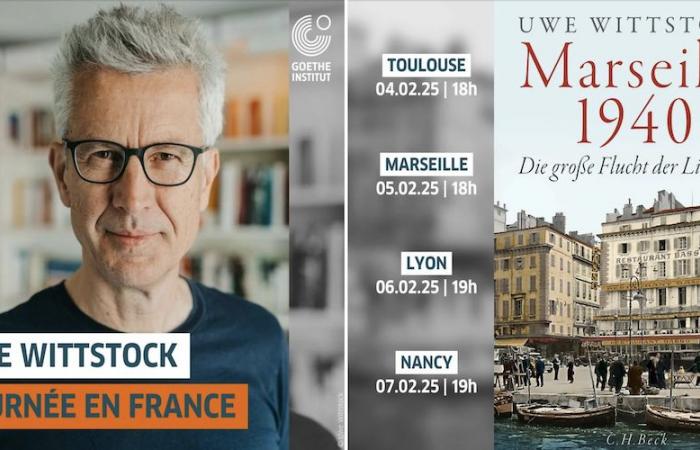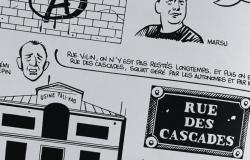
The Goethe-Institut de Nancy, in partnership with the Book on the Place, welcomes an exceptional literary evening on Friday, February 7, 2025, at 7 p.m., on the occasion of the publication of the French translation of Marseille 1940, when literature escapes (Grasset editions).
The author Uwe Wittstock will dialogue with Olivier Mannoni, translator of the book, around this poignant book which plunges into the heart of occupied France, where intellectuals, artists and writers tracked down by the Gestapo have taken refuge, hoping to find a path towards freedom. The discussion will be accompanied by Cornelia Geiser, performer.
Uwe Wittstock’s book highlights the crossed destinies of emblematic figures like Hannah Arendt, Walter Benjamin, Anna Seghers or Heinrich Mann, refugees in Marseille in the middle of the World War II. Faced with the merciless hunt for the Nazi regime and the growing collaboration of the Vichy government, these intellectuals find a fragile glimmer of hope thanks to heroic figures like the American journalist Varian Fry.
In a captivating writing, Wittstock gives life to this moment of cultural and political collapse, while paying tribute to those who dared to resist and offer help, despite the dangers.
Practical information: Goethe-Initut Nancy, 39 rue de la Ravinelle, Nancy; Friday, February 7, 2025 at 7 p.m. Free entry, on registration via this link.
June 1940: In the area occupied by the German army, the Gestapo hunted Hannah Arendt, Walter Benjamin, Anna Seghers, or Heinrich Mann, in addition to countless German and Austrian citizens who have taken refuge in France since 1933.
-Relegated to the rank of parias by the Vichy regime, intellectuals, artists, political and writers are fleeing to the largest port in the free zone, Marseille, hoping to obtain a visa for freedom. When they are not interned in the southern France camps, the greatest minds of the time rub shoulders with it in an extraordinary boiling climate, worthy of a provisional capital of culture. But the Marseille city quickly turns into an open-air prison with the intensification of collaboration, the adoption of anti-Jewish measures and the tightening of police surveillance. Suddenly, in the middle of the tragedy, an American journalist named Varian Fry offers a glimmer of hope …
With Marseille 1940Uwe Wittstock brings us back to the collapse of a world alongside its victims and his heroes.
Born in 1955, Uwe Wittstock is a journalist and literary critic. His bibliography includes books on Marcel Reich-Ranicki, Karl Marx, or contemporary German literature. He also held the post of correspondent of the newspaper The world in Paris for several years.
His previous work, February 33was published by Grasset editions in 2023.



